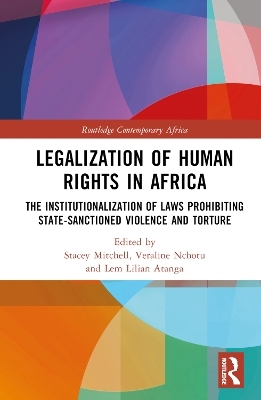
Legalization of Human Rights in Africa
Routledge (Verlag)
978-1-032-74949-5 (ISBN)
- Noch nicht erschienen (ca. Juni 2025)
- Versandkostenfrei
- Auch auf Rechnung
- Artikel merken
Most countries on the African continent have ratified or acceded to several human rights treaties, including the Torture Convention and the African Charter on Human and People’s Rights. This book assesses the progress African countries have made in institutionalizing human rights laws prohibiting torture, extrajudicial killings, and disappearances domestically.
States ratify human rights treaties for a variety of reasons. Some commentators defend an honest sincerity of purpose, whereas others might point to material incentives. The contributors to this volume go beyond the ratification puzzle to instead reframe legalization according to Lon Fuller’s conceptualization of congruence. Congruence is an interactive variable that measures the continuous efforts of government and the public to shape the law and its implementation. By reframing legalization as an ongoing process, the model created by the authors is used to test several hypotheses about what impacts legalization in Africa more broadly, and in countries such as Mali, Cameroon, Botswana, Zimbabwe, and Tunisia, more specifically. The contributors to this volume demonstrate that the legalization of human rights is never a finished product, but is a moving target influenced by exogenous and endogenous phenomena.
This volume is useful for researchers of genocide, human rights, and atrocity prevention, as well as for those interested in legalization and democratization both within Africa and other regions of the world.
Stacey M. Mitchell is an Associate Professor at Georgia State University’s Perimeter College, USA. Veraline Nchotu is a Research Fellow at Northeastern Illinois University’s Genocide and Human Rights Research in Africa and the Diaspora Center, USA. Lem Lilian Atanga is Associate Professor, Centre for Gender and African Studies, University of Free State, Bloemfontein, South Africa
Introduction to Legalization of Human Rights in Africa Part I: The Theory, The Model, And The International Regimes Regulating State-Sponsored Violence 1 What is legalization? 2 An integrative model for the assessment of legalization as congruence 3 The international legal framework for prohibitions against torture, disappearances, and political killings 4 The African human rights regim 5 The UN Charter-Based Processes and Evaluations of Africa’s Conflicts and Human Rights Protections Part II: Continent-Wide Progress In The Legalization Of Prohibitions Against Torture, Disappearances And Killings 6 Taking the broad view 7 Do peace missions in Africa matter? 8 How foreign investment fuels social conflicts in Africa Part III: Case-Studies 9 Cameroon and human rights at a time of national crisis 10 The struggle for human rights in Guinea 11 Civil society and the struggle for human rights in Tunisia 12 Zimbabwe and a reassessment of Institutional Anomie Theory 13 The power of regional peripheries: The making and unmaking of the legalization of human rights in Mali 14 Human rights as a moving target in Botswana 15 Conclusions
| Erscheint lt. Verlag | 1.6.2025 |
|---|---|
| Reihe/Serie | Routledge Contemporary Africa |
| Zusatzinfo | 20 Tables, black and white; 13 Line drawings, black and white; 13 Illustrations, black and white |
| Verlagsort | London |
| Sprache | englisch |
| Maße | 156 x 234 mm |
| Gewicht | 453 g |
| Themenwelt | Recht / Steuern ► Allgemeines / Lexika |
| Recht / Steuern ► EU / Internationales Recht | |
| Recht / Steuern ► Öffentliches Recht ► Völkerrecht | |
| Sozialwissenschaften ► Politik / Verwaltung | |
| ISBN-10 | 1-032-74949-0 / 1032749490 |
| ISBN-13 | 978-1-032-74949-5 / 9781032749495 |
| Zustand | Neuware |
| Haben Sie eine Frage zum Produkt? |
aus dem Bereich


